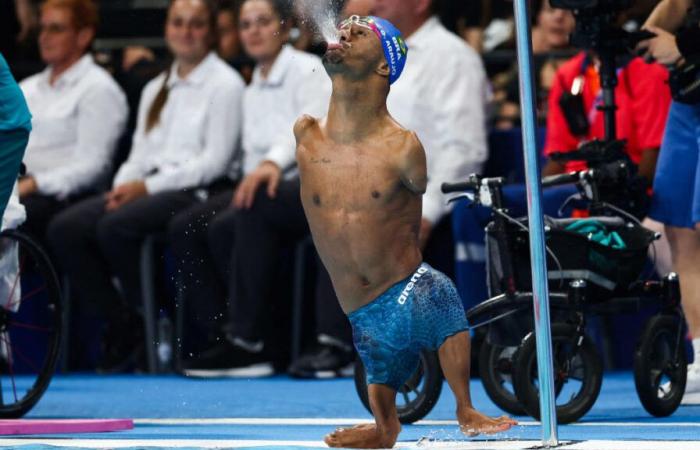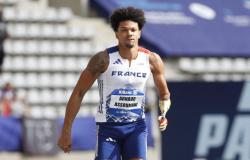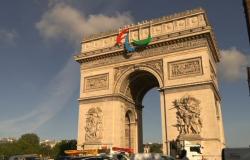PARALYMPIC GAMES – His goal of three gold medals in Paris has been achieved. While the Paris 2024 Olympic swimming pool has often thrilled the public this summer, Brazilian Paralympic swimmer Gabriel dos Santos Araujo and his ambitious dream of a Paralympic hat-trick are certainly among those to whom we owe this fiery atmosphere.
Paris 2024 Paralympic Games: Here’s how to navigate the disability categories
At just 22 years old, the young para-athlete began to shine last Thursday in the Paris La Défense Arena pool, with a prodigious race in the 100m backstroke, before continuing on Saturday with a new gold medal in the 50m backstroke. A final discipline where he had already won in Tokyo in 2021. And his hat-trick came to fruition this Monday, September 2 after his success in the 200m freestyle, in the S2 category.
The one Brazil calls ” Gabrielzinho » (« little Gabriel ») suffers from phocomelia, a congenital malformation due to the arrest of the development of one or more limbs during pregnancy. As a result, the star of the pools of these 2024 Paralympic Games is without arms, but has atrophied legs that allow him to walk but above all to swim like no one else.
Already three medals in Tokyo
After each victory in Paris, it’s the same story. As in Tokyo three years ago, Gabriel dos Santos Araujo celebrates each of his gold medals with a celebration of his own. The flag bearer of the Brazilian delegation for these Paralympic Games knows how to put on a show, and the public is not mistaken.
« Gabrielzinho ” was pushed into sports and swimming by his mother from a very young age. Thanks to her efforts, he already knew how to swim ” at 4 or 5 years old “, as his mother, Ineida Magda dos Santos, explains to AFP.
Interviewed in the recent documentary Body and soulGabriel dos Santos Araujo reveals that he escaped drowning several times during his young years of practice in the pools. And the more it happened, the more I wanted to learn to swim and to surpass myself. “, he says. It was finally at the age of 13 that the young Brazilian found himself for the first time in a swimming competition, during a school tournament. As an anecdote, it was a teacher who had registered him in secret, without telling the boy’s parents. Result of the races? Five medals won. ” Since then, he has not stopped.”admits his mother.
His Paralympic career began with a bang at the Tokyo Games, where he reached the podium three times, with two Olympic titles in the 50m backstroke S2 and 200m freestyle S2. Not to mention a silver medal in the 100m backstroke S2.
A unique swim
What his mother used to call ” gift of God » is ultimately closer to a « gift of nature “, so much so that Gabriel dos Santos Araujo has been able to adapt to the constraints of his body to get the best out of it in the water. With his coach Fabio Pereira Antunes, he has perfected a swimming technique that could be reminiscent of that of a dolphin. To put it simply, he performs pelvic movements, using the ” core “, or the different muscles of the abdomen and chest.
To achieve this, the young champion trains six times a week, not counting his training outside the water, based on weight training exercises. The result? An almost indisputable domination in the S2 category, reserved for athletes with a severe physical disability. On Sunday, September 1, he even finished fourth in the 150m medley final in the S3 category, which means that his opponents had a slightly less severe disability than him. Not enough to scare the Brazilian, who will still be competing in this category for the 50m freestyle on September 6.
Gabriel dos Santos Araujo’s success can also be explained by his communication skills, which have helped make him one of the darlings of the Paris Games. A communicative joy that also translates into increased popularity on social networks. Particularly Instagram, where he mixes teaching, humor and the daily life of a top athlete for nearly 240,000 followers.
Also see on Le HuffPost :
Paralympic Games: goalball, boccia… we followed the first day of events at the Arena Paris Sud – REPORT
Paralympic Games medal table: here’s where the French team stands in the rankings






